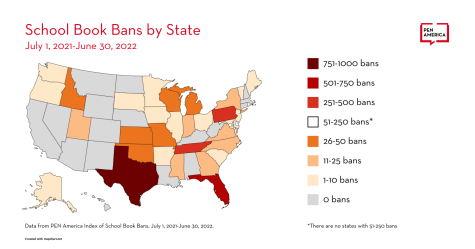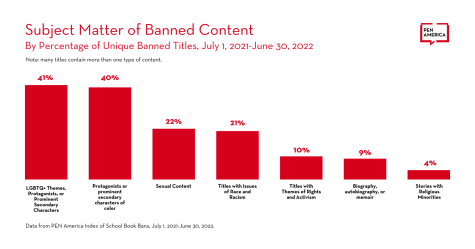Banned books to read over the summer
Due to recent outcries regarding critical race theory (CRT) and LGBTQ+ representation, parents and schools have started to enforce rules on the books children and students can read. As a result of vague policies and misinterpretations, books with powerful writing and messaging have become inaccessible to students across America.
May 15, 2023
As America continues to grow in diversity and inclusivity for all of its citizens, the nation currently faces major issues within its distribution of literature. Due to politicians such as Ron DeSantis and Greg Abbott demanding an end to critical race theory (CRT) and passing anti-LGBTQ legislation in early 2022, their followers have started to beg schools to ban books involving diverse characters. From 2021 to 2022, data from PEN America revealed that 41% of unique banned titles involved LGBTQ+ themes and characters while 40% of banned books included protagonist-like or prominent secondary characters of color. The effects of book banning have impacted NC, as the Cobb County School District has prohibited teachers from assigning certain books for summer reading. Thirty-two states and nearly 4 million students in America have experienced the ridiculous effects of book banning, and as a result, students across the nation have missed out on prominent titles with beautiful prose and incredible storytelling.

“I Know Why The Caged Bird Sings” by Maya Angelou
Regarded as one of the most banned books of all time, “I Know Why The Caged Bird Sings” was released in 1969 and remains an astounding chronicle of Angelou’s early years. Parents and schools have demanded the banning of Angelou’s debut memoir for bizarre claims of the book involving “sexually explicit and anti-white” content. In reality, the book does not exemplify any of these concepts, but rather the book portrays how the renowned poet grew up in spite of Jim Crow laws and traumatic experiences of racism. In addition to living in a segregated and rural Arkansas, Angelou, unfortunately, experienced sexual assault at eight years old and it resulted in years of selective mutism. Despite what critics have said about the book, Angelou does not glorify the acts of sexual assault; rather she portrays the detrimental effects of such an action on her childlike innocence through powerful vignettes of her life. For every chapter in this book, Angelou’s profound writing helps readers learn lessons about how to navigate life in the midst of racism and perversion, and it deserves recognition for its honesty.
“These stories shouldn’t be banned. The act of silencing these books only perpetuates this state of bigotry and oppression. ‘I Know Why The Caged Bird Sings’ perfectly illustrates the dangers of staying silent in the face of said oppression. Books about POC and LGBTQ issues should stay to prevent others from being complacent and encourage them to act,” McEachern High School sophomore Samuel Campbell said.
“The Color Purple” by Alice Walker
“The Color Purple” has stamped itself as a classic in American literature over the years. From film and musical adaptations to winning the Pulitzer Prize, Walker’s epistolary novel follows the iconic characters of Celie and Nettie. Due to Celie and Nettie’s father separating his two daughters from each other at an early age, they experience different circumstances that force them to question their thoughts on Christianity and masculinity. While Celie becomes a victim of verbal and sexual abuse and gradually grows into a sense of independence, Nettie takes on the role of a Christian missionary in Africa. This phenomenal book also portrays the effects of toxic masculinity through characters like Harpo— a man who wants to do housework but peers force him into invisible boxes of masculinity, resulting in him attempting to abuse his beloved wife. All in all, “The Color Purple” acts as a story that readers can learn powerful lessons about gender roles and should remain in classrooms for its progressive storytelling.
“Banning books that have been in cultures for years and still have a strong influence in that same culture will always be wrong. ‘The Color Purple’ has a huge influence on the Black community and still changes the overall outlook on being Black. Why is the book that represents my culture considered problematic?” North Paulding High School junior Nilah Reed said.
“The House on Mango Street” by Sandra Cisneros
Even though parents and school districts have demanded the removal of “The House on Mango Street” for its themes of poverty, sexuality and racism, this book acts as an accessible book for all readers. The short book follows Esperanza Cordero as she interacts with a plethora of neighbors on Mango Street in Chicago. Due to the neighborhood consisting of people with Hispanic heritage, this book does a beautiful job highlighting issues such as undocumented statuses and language disparities. As Cisneros wrote this book through the lens of a 12-year-old, she also manages to navigate sexism and misogyny through an adolescent’s perspective. For readers at NC with short attention spans or a lack of time for reading, “The House on Mango Street” stands as a great book, to begin with.
“I find the entire idea of having banned books, specifically in the U.S., extremely dystopian. The government has power to dictate what books its citizens can read seems arbitrary; it reminds me of ‘Fahrenheit 451’, a dystopian novel. Books provide people with new and unique perspectives on a myriad of topics and we need them to educate people. Everyone should be able to choose what books they want to read and the government shouldn’t be able to say otherwise,” magnet junior Lily Stooksbury said.





